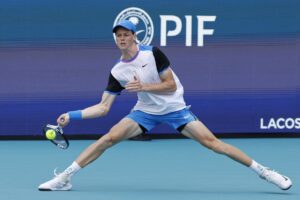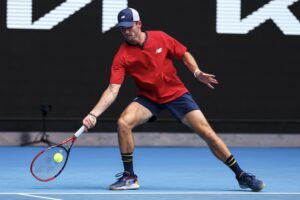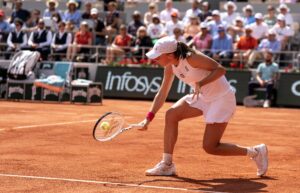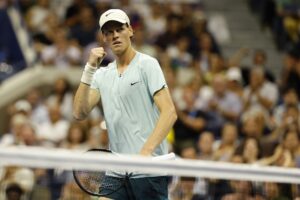There were some memorable major finals in men’s tennis during the 2000s and Last Word on Tennis picked out five of the best.
Andre Agassi beat Yevgeny Kafelnikov 3–6, 6–3, 6–2, 6–4 – Australian Open 2000
Agassi came into the first Slam of the millennium as the World No. 1, and on a run of three consecutive major finals, winning the French Open and the US Open with a loss to Pete Sampras at Wimbledon.
His Russian opponent was the defending champion having beaten Thomas Enqvist 4–6, 6–0, 6–3, 7–6 a year before and came in as the second seed.
Unsurprisingly, Agassi made the last-eight with a minimum of fuss, dropping just one set, to Mark Philippoussis in the fourth round.
He then breezed past Hicham Arazi to set up a mouth-watering semi-final with compariot Pete Sampras where Agassi fell two sets to one down but he edged the fourth in a tie-break before sealing a 6-4, 3-6, 6-7, 7-6, 6-4 triumph.
Kafelnikov lost the first set of his tournament against Jens Knippschild but recovered to win and made it to the final without dropping another set.
Like his American counterpart, this included beating a Morrocan in the last-eight before securing his place in a second successive showpiece but easing past twelfth seed Magnus Norman 6-1, 6-2, 6-4.
The Russian took the first set 6-3 but Agassi took command and led by two sets to one.
His second Australian Open title and fifth Grand Slam was sealed 6-4 in the fourth.
Goran Ivanisevic beat Pat Rafter 6–3, 3–6, 6–3, 2–6, 9–7 – Wimbledon 2001
Ivanisevic had pedigree at the grass court major reaching three previous finals, losing to Agassi in 1992 and Pete Sampras in 1994 and 1998.
However, since the latter final the Croatian had suffered with injuries and came into the 2001 at world No. 125 which was not high enough to earn an automatic place in the draw but he was given a wildcard due to his previous record at the All England Club.
Rafter came in as the third seed and reached the last-four the year before losing to Agassi in straight sets, his best run at Wimbledon.
Due to his lowly ranking Ivansevic faced a tough draw, beating Carlos Moya and Andy Roddick and Marat Safin in four sets to reach the semi-final.
He faced home favourite Tim Henman the sixth seed but took the first set before the Englishman claimed the next two including a 15 minute 6-0 second set.
However the rain came and the players had to resume the following day, Saturday, where the Croat leveled the match on a tie-break.
Five games into the deciding set, the rain came again so the players came back for a third day with Ivansevic sealing a remarkable victory, 6-3.
Rafter also had a tricky run to the quarter-finals with a couple of four sets victories before comfortably beating Thomas Enqvist.
His last-four match with Andre Agassi was a topsy-turvy encounter, with the pair trading sets before the Australian eventually prevailed 8-6 in the decider.
In one of the few finals to be played on a Monday, due to a rainy fortnight in SW19 ,the Croatian took the opening set but Rafter levelled by the same score.
Ivanisevic won the third set but the Australian hit back again to force a decider.
The fifth set seemed to last interminably, even more so when Ivanisevic twice had match point but double-faulted.
Eventually, it was third time lucky as a Rafter return sank into the net.
Rafter would never play at Wimbledon while Ivanesevic would return only once, in 2003, exiting in the third round.
Gaston Gaudio beat Guillerimo Coria 0–6, 3–6, 6–4, 6–1, 8–6 – French Open 2004
Gaudio entered the French Open ranked 44th and yet to make a Grand Slam quarter-final, his best run being the fourth round in Paris two years before.
His fellow Argentine was the third seed and had shown his prowess on clay having won tournaments in Stuttgart, Kitzbühel and Sopot and reaching the French Open semi-finals the previous year.
The 44th seed had an eventful run to the quarter-finals with his only straight sets victory coming over Igor Andreev in the fourth round, who had beaten defending champion Juan Carlos Ferrero.
Two more straight sets wins over twelfth seed Lleyton Hewitt and eighth seed David Nalbandian took him to his first Slam final.
In contrast, Coria had reached the last-eight without dropping a set with Nicolas Escude retiring after just one set in the fourth round.
The run continued with a tight win against impressive clay-courter and fifth seed Carlos Moya.
The Argentine finally dropped a set in the semi-final against Tim Henman but recovered to win in four and also reach his maiden Slam final.
After coming through semi-finals lineups which did not contain either Rafael Nadal or Roger Federer for the first time in 33 slams, it was the best chance either of them were likely to get.
In the first all-Argentine Grand Slam final, it seemed as it would play out as many expected with Coria storming into a two-set lead.
The Parisian crowd were so bored with the one-sided nature they had started in mexican wave in the third set but Gaudio took advantage of the atmosphere to stunningly force a decider.
Here, the turnaround was complete as Coria could not convert a 4-2 lead or two match points in what would be his only major final.
Gaudio’s only Grand Slam title remains the most recent French Open final to be decided in five sets, and the most recent Grand Slam final in which the winner came back from trailing two sets to love.
Juan Martin del Potro beat Roger Federer 3–6, 7–6(7–5), 4–6, 7–6(7–4), 6–2 – US Open 2009
Del Potro came into the US Open as the sixth seed and had reached his first Slam semi-final a few months earlier at the French Open, losing to Federer from two sets to one up.
Federer was the undisputed world No. 1 and had won the previous two Grand Slams, beating Andy Roddick at Wimbledon and Robin Soderling at the French Open. He was also on a run of five successive US Open titles.
The Argentine eased through to the quarter-finals, only dropping one set and beat Marin Cilic after failing a set behind, to reach the last-four.
Here he produced one his most accomplished performances, thrashing third seed Rafael Nadal 6-2, 6-2, 6-2.
Likewise Federer only dropped a single set in his first few rounds, to Lleyton Hewitt and edged Soderling in four sets including two tie-breaks to reach the last-four.
The Swiss also produced a surprisingly one-sided affair, easing past fourth seed Novak Djokovic 7-6, 7-5, 7-5.
The experience of Federer showed in the first set when he took away del Potro’s angles, and this coupled with strong serving gave him the early breakthrough.
Federer broke for 3-1 in the second set and the outcome seemed a formality but the Argentine broke back, eventually forcing a tie-break where he levelled the match.
The third set was a tight affair until del Potro failed to convert a break point in the nith game and two double faults handed Federer the set.
Roared on by the crowd, eager for a fifth set, del Potro grew in confidence and duly obliged by winning another tie-break.
He raced out two a 3-0 lead and with Federer failing to convert another break point, his 22nd of the match, the 20-year-old drove home his advantage to seal a famous win.
Novak Djokovic beat Jo-Wilfried Tsonga 4–6, 6–4, 6–3, 7–6 – Australian Open 2008
Djokovic came into the first Slam of the year as the third seed on the back of reaching his first major final months earlier, losing to Roger Federer at the US Open.
Tsonga had claimed the ATP Newcomer of the Year award the year before but had yet to reach a Grand Slam quarter-final.
The Serbian Djokovic took care of business easily, reaching the semi-finals without losing a set including victories over Lleyton Hewitt and David Ferrer.
His run continued, beating two-time defending champion Roger Federer 7-5, 6-3, 7-6 which ended the Swiss’ run of 10 consecutive Slam finals.
Tsonga endured a tricker path to the quarter-finals with a couple of impressive four-set victories over Andy Murray and Richard Gasquet, the ninth and eighth seeds respectively before beating Mikhail Youzhny in straight sets.
His opponent in the last-four was second seed Rafael Nadal but the Frenchman produced an outstanding performance, winning 6-2, 6-3, 6-2.
Tsonga grabbed the opening set but Djokovic only needed the one break to level.
He was then just a set away after a more comfortable third set before the Frenchman produced a defiant last stand but to no avail as Djokovic became the first Serbian to win a Grand Slam.
This would be the start of a love affair for Djokovic, the first of eight titles in Melbourne.
Main Photo:






